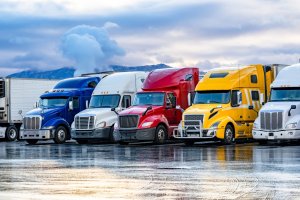Last Updated August 27, 2025
Turn your unpaid invoices into working capital for your business
Becoming an owner-operator gives you more control over your schedule, finances, and career, but it puts a lot of responsibilities on your plate. If you’re new to running your own trucking business, navigating the legal complexities and paperwork can be confusing.
One common source of stress for new owner-operators is the question of whether you need a business license. The short answer is yes, but the specifics depend on your location, business structure, and future plans.
Understanding the ins and outs of licensing will help you learn how to structure your business and pick the proper business license for a trucking company. Check out this guide to learn the difference between a business license and a business registration and how to get your business on the road legally.
What Is a Business License?
A business license is a government-issued permit saying that your company has the legal standing to do business in a particular area. Most businesses need some kind of license, whether it’s from their state or local municipality. Since most truckers cross state lines, you may need several business licenses to operate lawfully and avoid fines.
Business License vs. Business Registration
If you’re a new owner-operator with no experience, it can be easy to get tripped up by business jargon. Some people use “license” and “registration” interchangeably, but they’re two different things. You actually need both to set up a proper business.
A business license is a government permission slip showing you comply with the law. Business registration, on the other hand, is how you legally structure a business. Since you’re an owner-operator, that might mean registering as an LLC or S Corp.
Deciding how to structure your business as an LLC or sole proprietor will have an impact on when your taxes are due and how much you owe. These business structures also differ in terms of legal liability and protections.
Ultimately, you’ll need to decide on a business structure and apply for the relevant licenses for that structure. For example, LLCs offer more protections, but they require more paperwork and have stricter licensing requirements.
Do Trucking Owner-Operators Need a Business License?
You might not need a business license if you’re starting a trucking business with one truck. However, you should always check with your state, county, or city to see if they have unique requirements for trucking businesses.
Operating under your own authority means you’re in charge of sourcing business licenses. If you frequently drive across state lines, check out multi-state or federal permitting requirements to see if you need multiple licenses. At a minimum, you need to register your truck with the Unified Carrier Registration System to receive a Department of Transportation (DOT) number. You also need a commercial driver’s license (CDL) in good standing, as well as insurance and an IFTA decal.
If you’re leasing on with another company, they handle all of the paperwork and licensing for you. Still, you’re considered an independent contractor, so you may need a business license depending on state or local requirements. Sure, you’re using the trucking company’s authority and equipment, but you’re technically running your own small business, which is why leasing-on might still require additional licenses.
Other Licenses and Permits Needed to Start a Trucking Business
Whether you’re buying a truck or shelling out incorporation fees, there are several costs to consider when you’re starting a trucking company. If you’re leasing-on, you won’t have to pay for a truck, fuel, or licensing, but these are still common expenses for owner-operators to be aware of.
Every business is different, but you may need these other licenses, permits, and paperwork to run a bona fide trucking business:
- Trucking business plan (helpful for requesting funding from a bank)
- Commercial driver’s license
- Motor carrier operating authority number, which requires a BOC-3 filing
- USDOT Number
- International Fuel Tax Agreement (IFTA)
- International Registration Plan (IRP)
Keep in mind that specialized trucking companies will need additional licenses. For example, you’ll need a HAZMAT endorsement to haul hazardous materials.
In-Summary: Business Licenses for Owner-Operators
Don’t let the fear of red tape and bureaucracy stop you from working for yourself as an owner-operator. Decide how to structure your business (LLC vs sole proprietor) and file for the appropriate federal, state, and local licenses. Licensing ensures you follow the law and operate a legitimate business. While licenses aren’t required for all trucking businesses, they can give you more peace of mind and improve your professional image.
Interested in Factoring?
Turn your unpaid invoices into working capital so you can keep growing your trucking business.
Owner-Operator Business License FAQs
Do I need a business license if I plan to lease-on with another company?
Maybe. Leasing-on means you don’t have to manage nearly as much as the company you work for, but you’re still an independent contractor. State or local rules might require you to file for a business license on your own. Check for location-specific requirements and consult with your company to ensure you follow the law.
Does an owner-operator need an EIN?
Owner-operators only need an employer identification number (EIN) if they want to:
- Shield their social security number for business transactions
- Hire employees
- Establish an LLC
- Separate personal and business finances
What is the best business entity for an owner-operator?
The simplest option is a sole proprietorship, which requires minimal paperwork. However, this setup treats you and your business as one entity, which could hurt your personal finances in the event of a business bankruptcy. The safest option is to opt for an owner-operator LLC or S Corp, which gives you some tax benefits as well as a shield from liability.
Jennifer Lockett is the Freight Factoring Operations Manager at altLINE, the factoring division of The Southern Bank Company. Jennifer joined altLINE to spearhead the launch of the company’s new freight factoring program, bringing with her eight years of experience in the factoring industry and 18 years in the general trucking industry. Her firsthand experience working closely with drivers over the years has allowed her to carefully evaluate situations from a carrier’s point of view and navigate challenges effectively.










